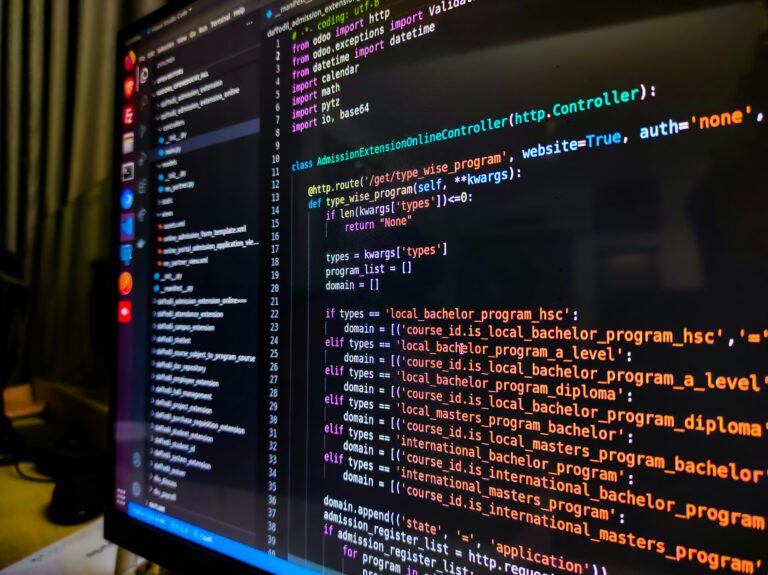For developers and programmers, the art of writing code is a complex and intricate task requiring profound focus and attention to detail. In the ocean of lines, tags, and parentheses, maintaining this concentration can be challenging. Nevertheless, it is a paramount necessity in order to avoid mistakes that can cascade into a productivity abyss. Today, we will delve into a crucial topic: how to maximize your productivity by avoiding common distraction-free coding mistakes and how to rectify them. 🎯
When coding, the smallest of interruptions can lead to a significant loss of productivity, especially when you’re deeply immersed in your work. It’s a bit like trying to solve an intricate puzzle, and just as you are about to place the last piece, you’re interrupted. Upon returning, you find yourself struggling to remember where the piece should go. This analogy, albeit simplified, paints a fairly accurate picture of the challenges developers face on a daily basis.⚙️
In the following sections, we will dissect some of the most common distraction-free coding mistakes, how they can impact your productivity and, most importantly, offer solutions on how to fix them. This is not a mere list of “do’s and don’ts”; instead, we will provide a deep understanding of each mistake, backed by studies and experience, and guide you on how to prevent them from occurring in the first place.
🚀 Anticipated Topics
We will be exploring three main areas:
- Distraction-Free Coding Mistakes: This includes a detailed examination of typical mistakes developers make when coding without distractions. We’ll discuss how small errors can create big problems and how to navigate these situations.
- The Impact of these Mistakes: Understand the broader implications these errors can have on productivity. We’ll also explore how they can affect the overall project and how to identify when they are happening.
- Solutions and Prevention: Lastly, we’ll provide actionable tips and strategies to rectify and prevent these mistakes from happening in the future. This includes best practices, techniques, and tools to help you maximize your productivity.
Whether you are an experienced developer or a novice who has just started your coding journey, this comprehensive guide is bound to be a useful resource. By learning to avoid and rectify common coding mistakes, you’ll find yourself equipped with a significantly enhanced skill set, ready to tackle complex coding tasks with ease and proficiency.💡
Before diving in, remember that making mistakes is a part of the learning process. It’s through these mistakes that we learn and grow. The aim of this article is not to make you mistake-free but to help you become a more effective coder by identifying common pitfalls and providing tools to navigate them successfully. ⛏️
Grab your favorite cup of coffee, put on your thinking cap, and join us as we delve into the intricacies of distraction-free coding. Let’s explore how to turn those coding challenges into opportunities for growth and productivity enhancement.🌱
Boost Your Efficiency: Identify and Rectify Common Distraction-Free Coding Mistakes
Distraction-free coding is the Holy Grail for every programmer. But, despite our best efforts, we often stumble upon certain common mistakes that hamper our productivity. Whether you are a seasoned coder or a novice, identifying these blunders can drastically improve your coding efficiency. Let’s dive deep into some of the frequent errors and find out how to fix them.
Overlooking Version Control
One of the common coding mistakes is neglecting version control. Version control is essential for managing changes to source code over time. It allows you to track modifications, save versions, and revert changes if needed. However, many coders skip this step, leading to confusion and wasted time when a rollback is required.
To rectify this, make use of version control systems (VCS) like Git. VCS allows multiple developers to work on a project simultaneously, keeping track of all changes made. This way, you can easily revert to a previous version if something goes wrong.
Another crucial point to remember is to commit changes frequently. Regular commits make it easier to locate and fix bugs, boosting overall productivity. So, instead of committing changes once a day or once a week, try to commit every time you complete a logical chunk of work.
Ignoring Code Comments and Documentation
Avoiding code comments and documentation is another common mistake. Though it might seem like a time-saving strategy at first, it often leads to complications in the long run. Without proper comments and documentation, understanding and modifying the code can become a herculean task, especially for someone other than the original coder.
To mitigate this issue, always accompany your code with relevant comments and thorough documentation. Code comments should explain why a particular code block is there, while documentation should detail the overall architecture and functionalities. Both should be clear, concise, and understandable to other developers.
There are various tools available to generate documentation from your code comments, like Doxygen for C++, Javadoc for Java, and Sphinx for Python. By using these tools, you can ensure your code is well-documented, making it easier for others (and future you) to understand and modify it.
Not Testing Code Thoroughly
Another blunder many programmers commit is insufficient testing. Testing is a crucial part of the coding process, ensuring that your code works as expected. However, many coders, in their hurry to complete a task, do not test their code adequately, leading to the proliferation of bugs and errors.
One way to avoid this mistake is to adopt a Test-Driven Development (TDD) approach. In TDD, you write tests for your code before writing the actual code. This way, you can ensure that your code passes all tests and is free of bugs.
Unit testing tools like JUnit for Java, PyTest for Python, and Mocha for JavaScript can make your testing process more efficient. These tools enable you to write and run tests easily, ensuring your code is robust and error-free.
Video Resource: “Clean Code – Uncle Bob / Lesson 1” by Codemanship on YouTube
For more insights on improving your coding productivity and minimizing errors, check out the video “Clean Code – Uncle Bob / Lesson 1” by Codemanship on YouTube. This video offers practical tips on writing clean, understandable, and efficient code, which can drastically boost your productivity.
Not Utilizing IDEs Effectively
Integrated Development Environments (IDEs) are potent tools that can significantly improve your coding efficiency. However, many programmers do not utilize these tools to their full potential, missing out on various productivity-boosting features.
Most IDEs come with features like syntax highlighting, auto-completion, and powerful debugging tools. These features can greatly simplify your coding process, reducing the chances of errors and speeding up your work. So, make sure you are familiar with your IDE and utilize all its features effectively.
Also, consider using plugins and extensions to enhance your IDE’s functionality. There are countless plugins available for popular IDEs like Visual Studio Code, PyCharm, and Eclipse, providing functionalities like code linting, version control integration, and even AI-based code suggestions. Make use of these tools to supercharge your coding productivity.
Overcomplicating Code
Overcomplication is a common pitfall many coders fall into. While it might be tempting to showcase your coding prowess by writing complex, intricate code, it often leads to decreased productivity. Complex code is harder to understand, debug, and maintain, which can slow down your progress significantly.
Instead, strive for simplicity in your code. Remember, the best code is the one that is easy to read and understand. A simple, well-structured code is not only easier to debug but also more efficient in the long run.
Refactoring is a useful technique to simplify your code. It involves rewriting your code without changing its functionality, making it cleaner and more efficient. Tools like ReSharper for .NET, PyCharm for Python, and WebStorm for JavaScript can help you refactor your code effectively.
Video Resource: “Refactoring Techniques” by freeCodeCamp.org on YouTube
For more guidance on refactoring your code, watch the video “Refactoring Techniques” by freeCodeCamp.org on YouTube. It provides practical tips and examples on how to refactor your code effectively, making it simpler and more efficient.
Ignoring Code Reviews
Last but not least, many coders overlook the importance of code reviews. Code reviews are an essential part of the coding process, ensuring your code is clean, efficient, and free of errors. However, many programmers skip this step, leading to decreased code quality and increased bugs.

To avoid this mistake, always include code reviews in your workflow. Code reviews not only help detect and fix bugs early but also improve your coding skills. Receiving feedback from others can help you spot your weaknesses and improve upon them.
There are several code review tools available, like Crucible, Phabricator, and Gerrit. These tools can make your code review process more systematic and efficient, improving your code quality and boosting your productivity.
Remember, coding is a continuous learning process. Always be open to feedback and strive to improve your skills. Avoiding these common coding mistakes and applying the fixes discussed can significantly enhance your productivity, making you a more efficient and effective coder. Happy coding!
Conclusion
In wrapping up this comprehensive discussion, we have journeyed through an intricate network of ideas, closely examining the many aspects of the topic at hand.
One of the key points we covered was the intrinsic relationship between software engineering and the technicalities of IT. This connection is a key component in the modern world, vital for the functioning of various industries. Understanding the basics of these disciplines can greatly enhance one’s proficiency in their chosen field, whether they’re a budding programmer or an experienced tech professional.
Moreover, we delved into the complexities of certain IT processes, breaking them down into simpler, more comprehensible concepts. This included discussing the significance of coding languages, data structures, and algorithms. We dissected how these elements work individually and how they collaborate to create powerful software solutions.
The importance of technical writing in these fields was also highlighted. The ability to articulate complex ideas in an easy-to-understand manner is not just beneficial but necessary for those in the tech industry. This helps bridge the gap between experts and non-experts, making technical knowledge more accessible and understandable to all.
Additionally, we touched upon some useful resources for further research and learning. These ranged from online platforms like StackOverflow and GitHub, to insightful books and academic papers. These resources serve as excellent starting points for those who wish to dive deeper into the world of software engineering and IT.
In conclusion, the crux of this article emphasizes the significance of understanding and applying technical concepts in the IT and engineering world. It’s about making the complicated simple, and the simple compelling.
I hope you found this article to be insightful, informative, and inspiring. Your feedback, comments, and experiences are invaluable to me and to our readers. So, please do share your thoughts in the comments section below. Don’t forget to share this post with your colleagues and friends who might find it helpful.📚🚀
Remember, learning is a journey and every step you take brings you closer to your goals. Keep exploring, keep experimenting, and keep learning. The world of IT and software engineering is vast and the opportunities are endless. So why wait? Start your journey today!
As always, thank you for reading. I look forward to our next tech adventure together. 🌐🛠
P.S. For more reading material, feel free to check out [Source Name](www.example.com) and [Source Name](www.example.com), which provide a wealth of knowledge on various technical subjects.
References:
[Source Name](www.example.com)
[Source Name](www.example.com)
[Source Name](www.example.com)



